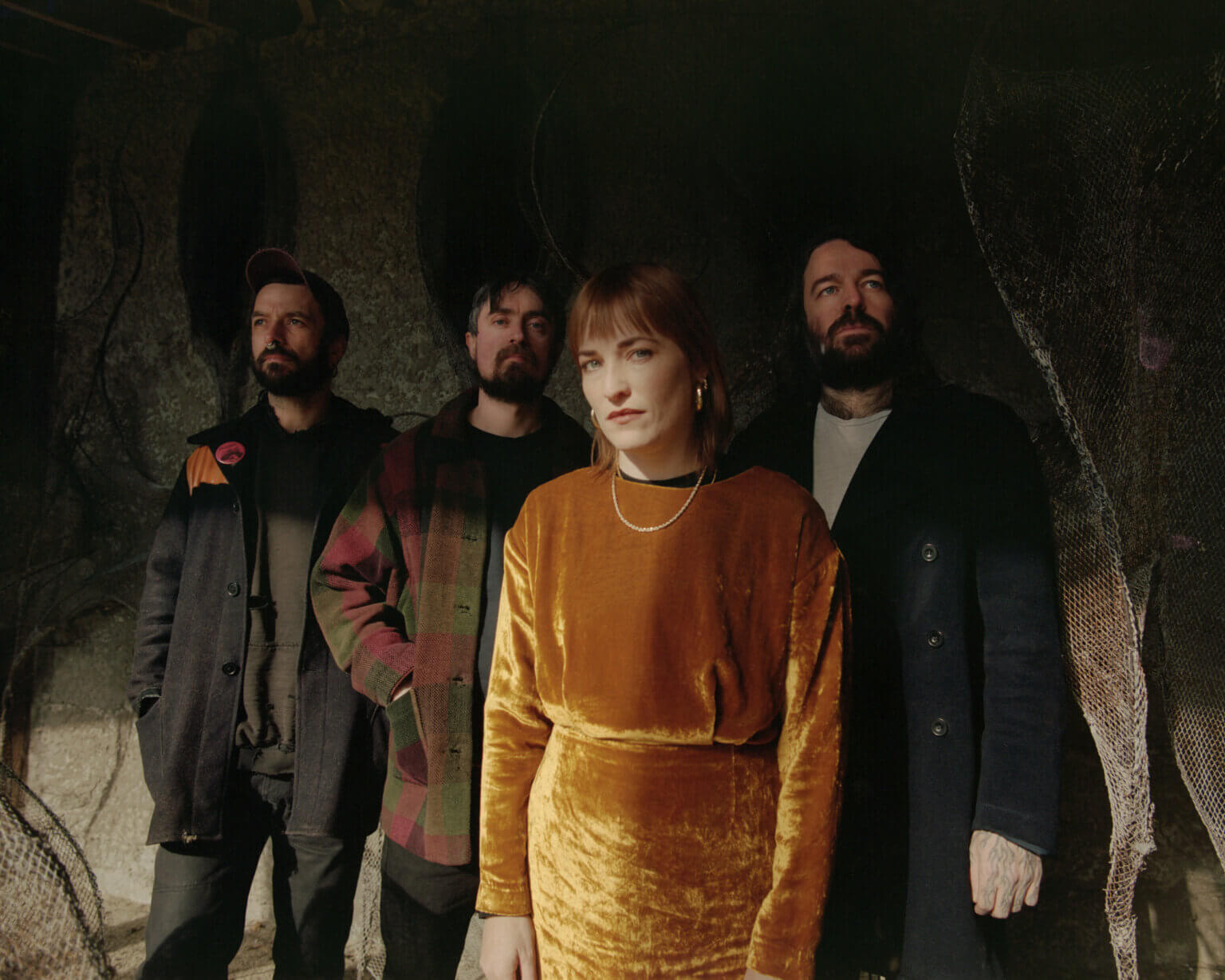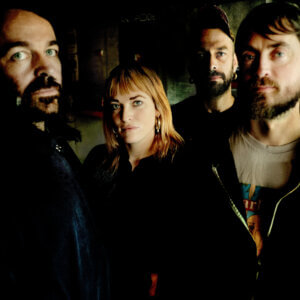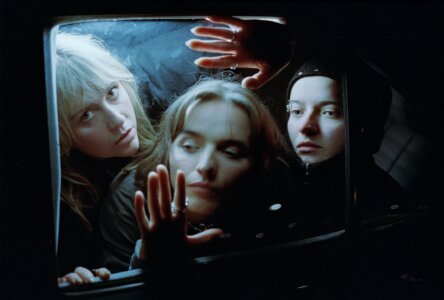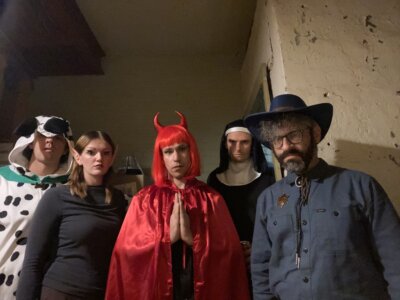Lankum Continue To Explore New Territories

“I think, regardless, there’s always a little fear whenever we go into the studio. It’s more us worrying if we can still actually play, says Cormac MacDiarmada over Zoom. A sweet air of self-deprecation disperses from Lankum’s fiddle player and multi-instrumentalist when asked if he and his bandmates felt additional pressure whilst recording their extraordinary fourth album (and third released via Rough Trade), False Lankum.
It’s no surprise that the Dublin-based quartet’s focus remains on their music and their ability to create the immensely developed and enveloping arrangements of False Lankum’s predecessor, The Livelong Day. That release, from 2019, saw the band’s stature grow significantly outside of Ireland. It was adored critically, receiving full marks from a number of revered publications in their reviews of the record, and while the band were touring the record in North America in March 2020, they crammed into the confined NPR Tiny Desk studio to give a commanding performance. It was during their time touring North America that Lankum learnt they’d received the Choice Music Prize (Ireland’s equivalent to Canada’s Polaris Music Prize, or the Mercury Prize based in the U.K.) where their manager took to the stage to accept the award on their behalf. Standing at the podium in the venue where the ceremony was being held in Dublin, he phoned the band and relayed that they had run into some issue with their van; a flat tire.
Since then, Lankum have become a beacon in reinvigorating not only an interest in traditional folk music in Ireland (and further afield) but the actual evolution of the genre, in some regards. Working closely with producer John “Spud” Murphy, Lankum have carved a style of music all their own, one that is wholly contemporary but rooted in immense history which is as integral to the final piece as the experimentation and explorations of sound made by each of the members and Spud.
And so, in early 2021, Lankum took to a Martello Tower in the picturesque Dublin suburb and popular site for sea-swimming of Dalkey to work on The Livelong Day’s anticipated follow-up. “It was great [being in this location] because there was a huge amount of space there. We were all able to go off and be in our own individual spaces so that while we were all living together it didn’t ever feel claustrophobic. We cooked a lot and then we’d play, it was really nice,” recounts MacDiarmada who is sandwiched between his bandmates, the Lynch brothers Ian and Daragh, when we speak about False Lankum. Absent from our conversation is Radie Peat, their inimitable vocalist and multi-instrumentalist whose contributions to the songs, especially her vocal performances, bring a haunting and transportative character to the work.
“We were able to go off for big walks around Dalkey which was great because there are so many nice walks you can do around there,” Ian Lynch continues before MacDiarmada conludes on the many merits of this idyllic setting, “It meant we could just take a breath from things and know that there were plenty of things to do. It was also great to have such relaxing surroundings and to enjoy the landscape, as well.”
Across Lankum’s releases, their innovative approach to instrumentation and production has breathed new life into their interpretations of both beloved and lesser known traditional tunes that have been passed through generations for hundreds of years. Whether it’s “The Wild Rover” made famous by Luke Kelly and The Dubliners in the 1960s, or ‘Katie Cruel’, the Scottish folk song which featured on Bob Dylan’s favorite female singer, Karen Dalton’s 1971 LP In My Own Time, Lankum have the ability to take these known tunes and make them their own through their richly textured arrangements, mind bending musicality and, of course, Peat’s inimitable cadence and the harmonies between them. With an endless selection of songs available for them to take as a blueprint for their sprawling sonic worlds, surely the process of picking a tracklist for their records is an impossible task.
Daragh Lynch notes that the music itself, in a way, leads them to their final destination. “With False Lankum, we picked the songs in the same way we’ve done before and wrote out a massive list of all the possible things we can do. In the end, we had maybe twenty different songs and tunes that could be possibilities for the album. From there, we went through everything to see what started working. If something’s goer that’s when we start to hammer things very loosely into shape. As the arrangement continues progressing, it becomes more and more evident which ones are really taking shape or manifesting into some form that we all like.”
On this occasion, Lankum opened the record with the striking and unsettling ‘Go Dig My Grave’, a harrowing tale of grief which Peat had discovered on an album 1963 entitled, Jean Ritche and Doc Watson at City. It is perhaps Peat’s finest vocal performance to date. Her timbre contains an almost indescribable character that makes you feel like you’re listening to a vocalist from a long gone era. Elsewhere, the looming grief of “Clear Away In The Morning”, by American folklorist and songwriter Gordon Bok, is heightened by the sense of remorse reverberating in the swooping drones and sensitively played acoustic guitar.
Amongst those lasting interpretations, and for a second time, Daragh Lynch penned two original songs for the record. “Netta Perseus” and the epic 13-minute closer, “The Turn”. When asked about how Lynch feels sharing his songs with the rest of the band, his answer tumbles out with a laugh: “I hate it!” He chuckles for a moment before considering his relationship with this side to his artistic expression, “I mean, I really like and enjoy the creative aspect of writing things but I go through phases of it. There’ll be times where I’ll not do anything for a while and then go through a phase of really trying to write things particularly if there’s an album coming up. It’s the classic thing of 99% of it is horrible and you just have to accept that fact and accept that you’re going to be horrifically embarrassed by most of the things that you do. And maybe one or two of [the songs] will be remotely decent and you might be happy, or even half happy with it!”
He concludes, again bashfully laughing at himself, “The prospect of even sitting down in front of anyone to play them something I’ve written is mortifying! Usually what I’ll do is I’ll make a demo and give it to people and be like, ‘Right, listen to that… I’m going to make a cup of tea!’”
Elsewhere, False Lankum is punctuated by a trilogy titled “Fugue I”, “Fugue II”, and “Fugue III”. These captivating instrumentals further demonstrate Lankum’s deft musicianship as well as their unparalleled ability to create wonderfully dense arrangements that reveal something new upon each return and present the listener with a myriad of moods, sometimes all within the space of a minute. These liminal compositions are unsettling, spooky, hopeful and bright all at once, and as Daragh Lynch describes, “were a new way for us to structure a whole body of work.” They initially began as one piece of music developed by the band before becoming an integral structural device. This was one of the many instances where their natural inclinations towards experimenting – encouraged further by Spud – brought about new ways to approach their sound.
MacDiarmada further ruminates further on the triptych, “I don’t think we’d, especially not on albums, experimented with the kind of swirls going through the Fugue triptych. They glisten quite a lot. They’re a sort of break and bring the music into a different space.”
Naturally, the live experience is another way to bring the music in a different space, in literal terms at least. The Lankum live experience is nothing short of spellbinding as the four members merge into one immense and immersive sound. It’s almost unnatural that the melodies emanating from the musicians come from familiar sources such as guitars, fiddles, uilleann pipes and coloured with the vibrant tones of organs, concertinas, tin whistles, and harmoniums. Lankum’s live performances completely transform the listeners’ relationship and perceptions of the songs. And what of their own relationships with the songs after going through the intimate process of recording the songs and delving further into their essence on the road?
“It’s a really different thing,” Ian Lynch considers. “I think arranging songs in the studio is such a process and it can be a long process. With False Lankum, and I suppose with our last album, as well, there’s lots of experimentation in the music which was us finding different sounds that work within the songs and ultimately work with the arrangements. Then, when we come to arranging the songs to play them live it’s almost like going back to scratch again. We’re back to square one with the songs, in a way. Because we have to figure, ‘Are we actually going to be able to do something like this live?’ And, a lot of the time, it ends up being quite different. I mean, if you take any of the songs on the album, all of us are playing a number of different instruments and there are other elements involved, as well, so the basic question of ‘who’s going to play what instruments on a song?’ is the starting point, really. We have to figure out what kind of sounds to keep and that’s what we’ve to do now to prepare to tour the album.”
He continues,“I suppose, within that then, your relationship to the songs changes quite a lot because you have to think about it in so many different ways. Then you start playing them live and you get used to playing them in a different way, maybe, and get confident playing them and the song becomes something else all together again!”
In the blossoming stages of their relationship with the songs during which each member brings an individual flair to the songs, an additional set of hands (and ears) leaves a striking imprint on the work. Their instinctual collaborative relationship with John ‘Spud’ Murphy has given him unofficial fifth member status. He has been the driving force of the mesmerizing and menacing drone-centric current that rumbles throughout their arrangements; lending an extremely compelling darkness to their tonal palette. “Spud creatively looks at things through a magnifying glass. He gets really absorbed into the process and the songs and he’ll know exactly what to draw out and draw it out in the best way possible. He definitely realizes a darkness, in some ways, within all the richness that we like to see burst out; he really helps drive that,” says MacDiarmada of Spud’s role within the group dynamic which Ian Lynch immediately follows with, “We just wouldn’t be doing what we’re doing without him. It really is as simple as that! He’s just really important to us and our sound.”
As our conversation comes to a close, the three guys share their favorite songs from False Lankum. Ian Lynch is first to offer his picks, “I think for me it’s either ‘Lord Abore and Mary Flynn’ or ‘Master Crowley’s’. I don’t know which one I like more! I love the sweetness of ‘Lord Abore’, because I love listening to Cormac singing it. It’s so much sweeter than I could ever sing it. I really like ‘Master Crowley’s’ mainly because it’s so demented! The middle section, where it all goes whoomp and rages out and then comes back with the down-tuned fiddle over that is absolutely manic, I think. It sounds like a body that’s possessed and dancing and limping around the place because it’s been taken over by some other force,” he smiles.
Next, his brother Daragh chooses ‘The New York Trader” as it’s, as he notes, “a really nice encapsulation of a lot of the things that we do in one song.” He expands, “Whenever I listen back to it now, I find the two big changes in it are still very exciting. When it kicks back in with more low-end and goes into the tunes and then goes in for a second round of the tunes, when the low-end comes in again, it is just like…mmmm.”
MacDiarmada chimes in, “And the single note piano! The single note hits when the phrase starts again and it’s just like a gentle doom because it’s already quite fervently building into that space. I really enjoy the interplay between everything in that song, as well. Everything has its own place and the elements evolve at different points and it’s quite satisfying when they all eventually meet in the middle and then they go off in their own individual directions, as well. There’s a constant routing in it that repeats and that’s really satisfying.”
The day after we speak, the trio tell me that they will begin rehearsing for the False Lankum tour which will take them around Europe and the U.K. from the end of April and then traveling through North America in the autumn. How are they feeling about bringing this album on the road? “I think it’s going to be a lot of fun!,” MacDiarmada says with an infectious smile. “I mean, it’ll be frustrating at times, but there’s a bunch of the new songs that I’m really excited about playing. Obviously we won’t get to play every song on the album at the shows, that’s just the nature of it. But, like we were saying, the stuff that is going to be played live will gather its own force and strength and will just be different to how it is on the album. I think from doing the live streamed show at The Abbey Theatre during lockdown, we purposefully made a show to have a kind of continuum. We’ve been trying to do that a lot more within our live shows going forward. So yeah, it becomes a different beast.”
order False Lankum by Lankum HERE
Latest Reviews
Tracks
Advertisement
Looking for something new to listen to?
Sign up to our all-new newsletter for top-notch reviews, news, videos and playlists.









